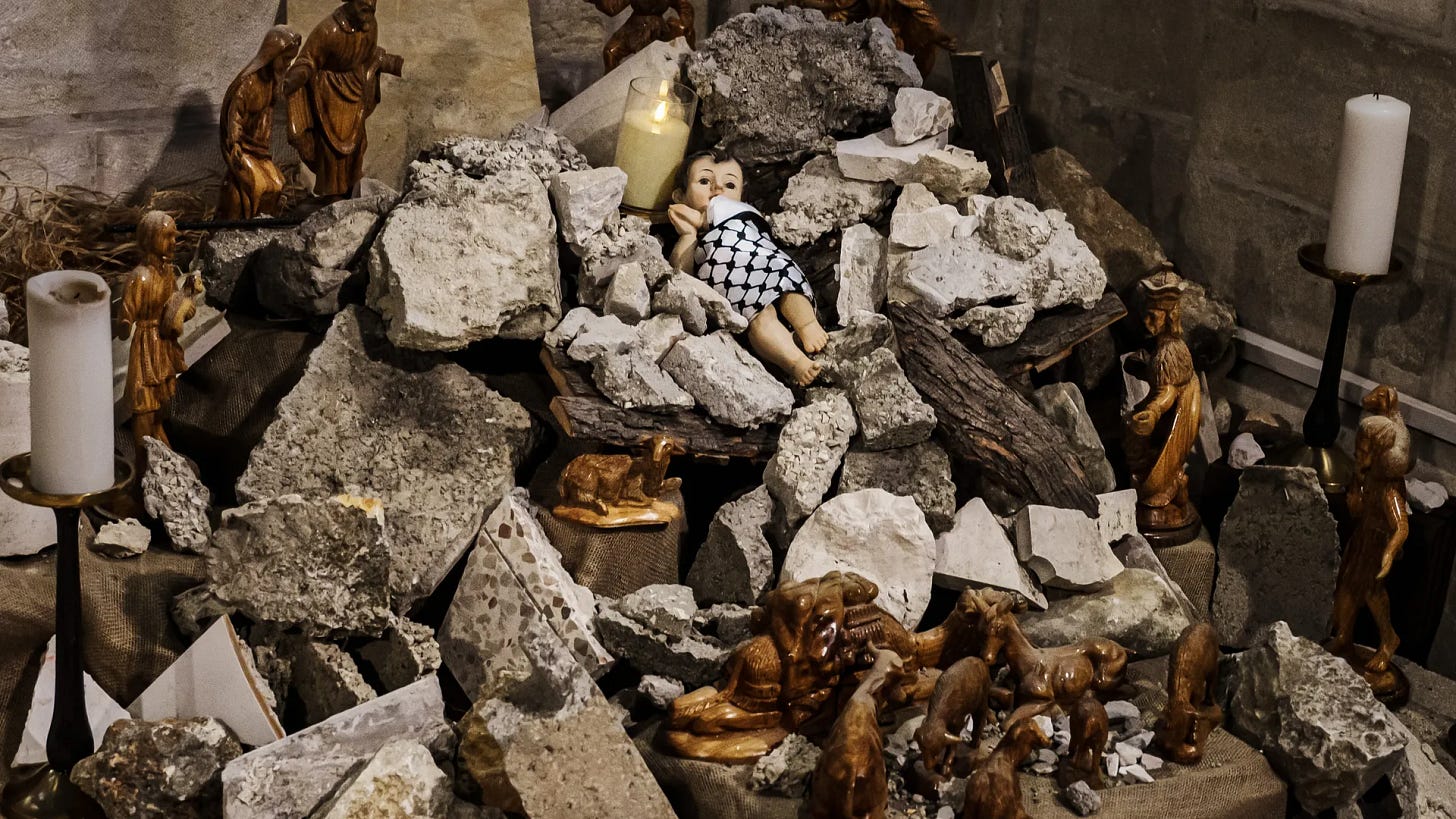Christmas is Cancelled in Bethlehem
Christmas, Israel-Palestine & the Myth of a Separate Church and State
This essay is part of the "Rewriting Common Sense" series, which will end with a rewrite of Thomas Paine’s Common Sense pamphlet on its 248th anniversary — January 10, 2024.
In this essay, we explore the logical fallacy inherent in America's separation of church and state, particularly as it is reflected in the culture of American politics.
This paradox is highlighted by the way politicians benefit from Christian rhetoric without adhering to the fundamental Christian virtues of empathy and compassion, as noted by Paine’s writings.
Despite the legal framework established to prevent government favoritism of religion, recent events have exposed a failure in upholding these foundational principles.
The Christmas nativity scene at the Evangelical Lutheran Christmas Church in Bethlehem this year. Photo: Marcus Yam/Los Angeles Times via Getty Images
Over the past few days, I found myself pondering a historical curiosity: if Jesus were born in the West Bank of Palestine today, as historians believe he was more than 2000 years ago, what would be his fate? And more, as America continues to thwart global efforts towards a ceasefire, would my country be to blame?
My curiosity began as I watched the celebrations of Christmas overshadowed by a stark and somber reality. As the conflict in Gaza continues and violence persists in the West Bank, the Palestinian communities face a season of grief rather than celebration.
In a vivid illustration of this changed atmosphere, the Latin Patriarch of Jerusalem's arrival in Bethlehem for the traditional Christmas Eve procession was met with an unusual quietness. The city, normally alive with the sounds of marching bands, concerts, and the cheerful voices of crowds, was subdued. The festive adornments that typically bedeck the city were notably absent. Manger's Square, which usually boasts a towering Christmas tree, was bare.
The changes went deeper than just the absence of festive decorations. This year, nativity scenes were juxtaposed with rubble, a poignant reminder of the ongoing strife. The mood among Palestinian Christians, typically filled with festive cheer, has turned to one of mourning. The reason for this sorrow is heartbreakingly clear: the loss of over 20,000 Palestinians in Gaza since the conflict began, as reported by the Ministry of Health in Hamas-run Gaza.
Varsen Aghabekian, a member of the Armenian Christian community in Ramallah, captured the sentiment poignantly: "This Christmas is like no other Christmas... in my lifetime. This year, it's a very sad time for all of us."
This statement resonates with the pain and the altered reality of a community traditionally steeped in celebration during this season, now grappling with loss and conflict.
Historians widely believe Jesus was born in the region now known as the West Bank. Imagining his life during the present-day Israel-Palestine conflict is a haunting exercise. Given the staggering statistics — over 95% of Gaza's population displaced, more than 20,000 deaths, including thousands of children — it's likely that Jesus, were he among us today, would have been either a casualty or a refugee.
This stark juxtaposition of the historical figure central to Christianity with the grim realities of modern conflict underscores a profound dissonance in American politics, particularly in how the nation reconciles its religious rhetoric not just with its foreign policy actions, but with its economic practices.
The Historical Intent and Modern Failures of the Separation of Church & State
The U.S. Constitution does not explicitly state the separation of church and state. This concept was introduced through the First Amendment, which prohibits the establishment of religion by Congress. The phrase "separation of church and state" itself comes from a letter written by Thomas Jefferson, reflecting his interpretation of the First Amendment. This interpretation has been upheld by various Supreme Court rulings, establishing a legal separation even though the exact phrasing is not found in the Constitution.
The entwinement of Christianity in American politics can be traced back to the nation's inception. During the late 18th and early 19th centuries, America, emerging from a revolution, was grappling with its identity. The founders, in their wisdom, sought to prevent the establishment of a national religion, as seen in many European nations. However, the cultural dominance of Christianity was undeniable.
The First Amendment's establishment clause has long been interpreted to mean that the government should not favor one religion over another, nor should it pass laws aiding religious institutions in a way that it does not for nonreligious groups. This principle of disestablishment is integral to maintaining a secular state. However, recent developments suggest a troubling shift.
A stark example is the Payment Protection Program (PPP) during the coronavirus pandemic. This program, designed to support small businesses with $669 billion in subsidies, controversially extended funding to churches and other religious organizations. The implications of this are profound: the government is not only supporting religious groups but also funding activities inherently tied to their religious practice, such as clergy salaries. This action represents a significant departure from the longstanding principle of disestablishment and raises questions about the separation of church and state in practice.
Palestinians march in protest on Christmas Day.
Such developments challenge the notion that America has a clear separation between its religious institutions and its government. This erosion of secular principles is not just a legal issue but a cultural one, reflecting a broader trend in American politics where religious rhetoric often overshadows secular policymaking.
The irony of this situation becomes more apparent when viewed through the lens of historical ideals and the teachings of key figures like Thomas Paine. Paine, in "Common Sense," advocated for governance based on reason and empathy, principles that seem increasingly at odds with the current political climate, particularly regarding the treatment of religious institutions.
This paradox is further exemplified by the federal recognition of Christmas, a Christian holiday, which serves as a stark reminder of the nation's political entrenchment in Christian rituals and rhetoric.
Yet, this recognition contrasts sharply with policies that perpetuate poverty and oppression, failing to embody the Christian golden rule: "Treat others as you want to be treated." Thomas Paine, a revolutionary thinker, emphasized this principle in "Common Sense," advocating for empathy and reason in governance.
America’s Need for The Golden Rule
Returning to the principle of empathy, as echoed in the Christian golden rule, one must question how these recent policies align with the notion of treating others as we would want to be treated. The preferential treatment of religious organizations in policy, like the PPP, not only contradicts the legal foundations of the United States but also the moral and ethical standards that many of these religions, including Christianity, purport to uphold — in both domestic and foreign policy.
Consider the life of Jesus, believed by historians to have been born in Palestine. If he were alive during the Israel-Palestine conflict, given the displacement and death toll in Gaza, Jesus would likely have been a victim of this conflict.
This thought experiment serves to highlight the disparity between the Christian principles professed by many American politicians and their actions, especially in foreign policy.
In conclusion, it's crucial to consider how Jesus, known for his defense of the defenseless, might view America's role in conflicts like the Israel-Palestine situation. Particularly, how would he perceive the plight of innocent Palestinian civilians, caught between the forces of Hamas and the Israeli military? This query invites us to reflect on the extent to which American politics, while steeped in Christian rhetoric, aligns with the core values of empathy and compassion central to Christianity and espoused by thinkers like Thomas Paine.




